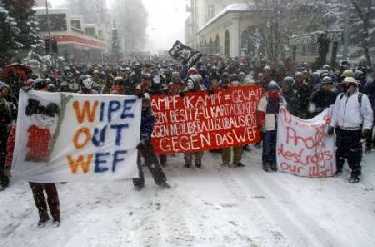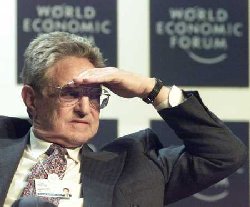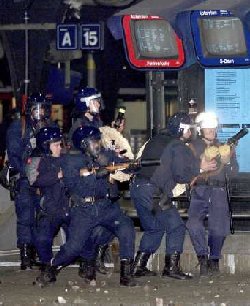 "Arseholes who are expert at making something out of nothing ... appeared equally capable of making nothing out of something." - John Le Carré on the press in "The Constant Gardener"
"Arseholes who are expert at making something out of nothing ... appeared equally capable of making nothing out of something." - John Le Carré on the press in "The Constant Gardener"
http://www.mediachannel.org/views/dissector/davos2001.shtml
By Danny Schechter
"Arseholes who are expert at making something out of nothing ... appeared equally capable of making nothing out of something." - John Le Carré on the press in "The Constant Gardener"
January 28, 2001 - Church bells are ringing on this bright Sunday morning high up in the Swiss Alps as Davos digs out of the daily snow shower and eases up on the siege that has turned this ski resort into an armed camp. For a week, heavily equipped police and military units have turned the glitzy promenade - best known for jewelry shops and pricey hotels - into a bad version of Berlin's old Checkpoint Charlie. The show of force was designed to protect the annual meeting of the World Economic Forum from the hordes of anti-globalization demonstrators who wanted, officials feared, to turn Davos into another Seattle, where demonstrations disrupted World Trade Organization meetings in 1999.
From the media perspective, this sideshow has become a central focus, as if the odd rock crashing through a McDonalds were more important than the speeches of the 25 heads of state who trekked here to lobby the many investment bankers and government officials ensconced in luxury suites across the street. The threat of violence - echoing last year's Forum, when one policeman had to be taken to the local hospital - has been elevated into an excuse to bar all protest. "Switzerland hasn't been at war since the 16th century," one business exec reminded me, "so for the military this is a great training exercise." His comment in turn reminded me of a remark by a Pentagon official about an anti-Vietnam war protest. "What am I going to tell my grandchildren, that I defended the south parking lot against the hippies?"
 For the Forum, it's been a public relations disaster that's allowed protesters to reinforce the view that the Forum is an outpost of the "evil empire." Tempers have frayed. Financier George Soros told me that the protesters managed to get more attention than all of the work of his many foundations. He told me about being stuck in a massive traffic jam while police repelled a small group of demonstrators who'd made it into Davos. (Others had been physically put on trains and sent packing.)
For the Forum, it's been a public relations disaster that's allowed protesters to reinforce the view that the Forum is an outpost of the "evil empire." Tempers have frayed. Financier George Soros told me that the protesters managed to get more attention than all of the work of his many foundations. He told me about being stuck in a massive traffic jam while police repelled a small group of demonstrators who'd made it into Davos. (Others had been physically put on trains and sent packing.)
The media scrambled to cover the protests, which had - outrageously - been banned by the Swiss government, not the Forum. (After mass protests disrupted a regional World Economic Forum summit in Australia last year there was no doubt pressure to insure that the good burgers of Switzerland would not face a similar occurrence.)
But all media were not treated equally in covering the event. An Independent Media Center (IMC) team had a battle to find a place to operate from. Their "facility" had been harassed by the police and, according to organizers, some of their equipment taken. But they did find a place to park their bus in an area marked by a cardboard sign that made the place look like a homeless shelter. It was quite a contrast with the big broadcast booth that CNBC had built for itself across the street from the Conference Center.
The major media were all here, with the business press heading up the pack. Once again, most of the working journalists who were filing stories were packed into small rooms in a basement that originally had been built as a fallout shelter. Some of the reporters joked that the place had the feel of a Third World sweatshop, with working conditions of a kind that some panelists and most NGO groups were denouncing on various panels. Senior editors were given the prized all-access white passes (I wangled one) that allowed them to mingle and participate. Some journalists were not just covering the proceedings but taking part - folks like The New York Times' Thomas Friedman, author of the pro-globalization bestseller, "The Lexus and the Olive Tree." (One sound bite from his appearance: "Everyone in the world living on a dollar a day will have Palm Pilots before you can get a fair trial in Zimbabwe.") Top editors and prestigious columnists like William Safire, also of the Times, are considered part of a "media leaders club" and treated to closed events. Your News Dissector worked his way on occasion into the company of such notables, wining and dining at Coca Cola's expense.
To my delight, the Forum turned out to be far more than some Nuremberg-style rally for the status quo. The opening panel featured leaders from Africa, Asia and Latin America, all of whom challenged the unfair trade arrangements in the world, especially lack of aid and investment, and demanded changes in the global order. They all wore suits and ties but were no less angry and eloquent than the bandanna-wearing activists who came with blanket denunciations of the whole shebang. The speakers from the South indicted aspects of economic globalization with facts and figures, not just slogans: Even a critic of the empire like myself wished that many more people could have heard their strongly worded arguments and found a way to make cause with developing nations.
Unfortunately, the economic turndown underway in the North may lead to less coverage and less sympathy for the needs of the South. Perhaps that's why 3,000 activists and others from around the world staged their own "counter-Davos": the Third World Social Forum, at Porto Alegre, Brazil, where the director, Egyptian economist Samir Amin, called globalization "a new phase of the imperialist expansion of capital, a fig leaf to hide imperialism itself." Activist groups were on hand counterposing their summit as representing a possible future to Davos, symbolizing an oppressive present. It is part of the continuing challenge to the view that there is no alternative to a market driven economic order. Davos got gobs of coverage, Brazil a fleeting mention.
One media effort in Davos to promote a dialogue between the two worlds was sabotaged by the Davos Forum, which at first encouraged and then rejected a proposal for a "space bridge" created by Indy producer (and MediaChannel Advisor) Patrice Barrat, of Article Z and the Paris-based TV show "Mad Mundo". He did put together an impressive panel that included George Soros, Harvard economist Jeff Sachs, Bjorn Edlund of Asea Brown Boveri, a global energy company that also helps underwrite MediaChannel. Unfortunately, this had to be done as a guerilla operation because the Forum refused to give Barrat and his team accreditation, thus damming a needed channel of dialogue between opponents and supporters of globalization. Check out "The Globalization Divide" to watch it online.
Another group of critics of the World Economic Forum, a Switzerland-based NGO called Public Eye on Davos, refused to invite any Forum execs to their critical panels (one of which I moderated) for fear of co-optation and being lied to. Dialogue is tough when both NGOs and Forums refuse to facilitate it.
What was also striking about the Forum this year was the presence of writers, artists, film producers and even celebrities, such as supermodel Naomi Campbell (representing the Nelson Mandela Children's Fund in South Africa) and Oprah Winfrey, representing the global brand that is Oprah. Singers like Senegal's Youssou N'dour blew minds with their powerful voices, while a South African choir led by the always brilliant Caiphus Semenya and his wife Lette had CEOs dancing in the aisles. Peter Gabriel, Brian Eno and South African filmmaker Anant Singh were honored, along with record producer Quincy Jones. Is the corporate bourgeoisie in danger of becoming a hipoisie? Oh yeah, the top exec from Napster was on hand, along with reps of music and media companies like Sony and the newly merged AOL-Time Warner. Half of the people here had their eyes permanently stuck at chest level reading the picture IDs of the people next to them. In business, as you soon learn, know-who is more important than know-how.
 And speaking of pictures, I have saved the best for last. Oliviero Toscani was here, snapping photos and talking about his well-known and provocative photos that have graced Benetton ads and Colors magazine. A moving video of his, contrasting images of abject human degradation and scenes of space exploration, drove home a sense of the great gaps in wealth and power in the world that both NGOs and the Forum say they want to change. (The video will be posted on the Forum site.)
And speaking of pictures, I have saved the best for last. Oliviero Toscani was here, snapping photos and talking about his well-known and provocative photos that have graced Benetton ads and Colors magazine. A moving video of his, contrasting images of abject human degradation and scenes of space exploration, drove home a sense of the great gaps in wealth and power in the world that both NGOs and the Forum say they want to change. (The video will be posted on the Forum site.)
I went to a dinner where Toscani showed slides of 18 years of his work, then revealed that he left Benetton a year ago when the strong whiff of censorship started blowing through the company's corridors after protests greeted his stunning portraits of American prisoners on death row. After some retail outlets like Sears pulled products in protest, or threatened to, the management that let him do his thing for so many years began to interfere. Toscani got the drift. He quit.
I found his discussion of the contradictions of making a political statement in a commercial advertising format fascinating and quite relevant to what was taking place among business leaders in the Forum panels. "I was often criticized by some for exploiting misery to sell sweaters, while I always believed I was exploiting sweaters to show misery," he said. Many of his photographs would never have found their way into magazines and newspapers if not placed as paid advertising. As a result his work and passions were seen by millions worldwide.
He told me that he and his brilliant team of ex-Colors editors are now exploring a Web project. What will he have on it? One guess: mug shots of the power elite that attended this year's World Economic Forum. Toscani had set up a studio at the top of a grand staircase, where everyone - decked out in tuxes and gowns - had to pass to get to an annual soirée. Most stopped to have their pictures taken, posing for the biggest subversive in the media business.
I, of course, let him take mine as well and then asked what he planned to do with the pictures after the event was over. He responded with a laugh. "They are," he said in his Italian-inflected English, "for Fidel Castro and Cuban intelligence." I just hope I don't end up in his hall of shame.
- Danny Schechter is the executive editor of MediaChannel and the author of "News Dissector" (Electronpress.com) and "Falun Gong's Challenge to China" (Akashicbooks.com).
FEEDBACK: We are very happy to receive comments to dissector@mediachannel.org and will post them in our Forum. Please let us know if you want to remain anonymous or if you do not want your comments online.